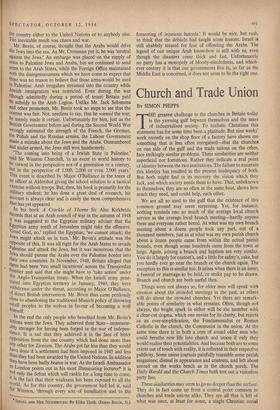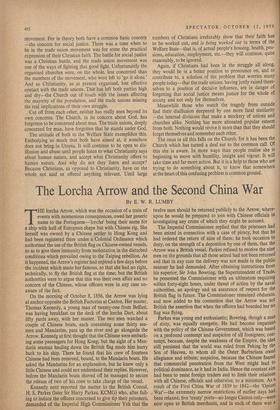Church and Trade Union
BY SIMON PHIPPS THE greatest challenge to the churches in Britain today is the yawning gulf between themselves and the mass of industrialised society. To realistic Christians this statement has for some time been a platitude. But nine weeks' work recently on the shop floor of a factory have shown me something that is less often recognised—that the churches on one side of the gulf and the trade unions on the other, face strikingly similar problems. These similarities are neither superficial nor fortuitous. Rather they ' indicate a real point of identity between the two institutions. The failure to maintain this identity has resulted in the present inadequacy of both. But both might find in its recovery the vision which they lack, and which society needs them to have. That, unbeknown to themselves, they are so often in the same boat, shows how much they need, and could help, each other.
We are all so used to the gulf that the existence of this common ground may seem surprising. Yet, for instance, nothing reminds one so much of the average local church service as the average local branch meeting—hardly anyone there and everyone rather bored. At what was my own branch meeting about a dozen people took any part, out of a thousand members, just as at what was my own parish church about a dozen people came from within the actual parish bounds, even though some hundreds came from the town at large. Again, joining a branch and baptism are very similar. You do it largely for custom's, and a little for safety's, sake, but you hardly ever go near the branch or the church-again. The exception to this is similar too. It arises when there is an issue; a funeral or marriage to be held, or strike pay to be drawn. Branch and church are both useful then.
Things were not always so, for older men will speak with emotion about the crowded meetings in the past, as others will do about the crowded churches. Yet there are remark- able points of similarity in what remains. Often, though not always, the bright spark in either will be the member with a clear-cut dogma, which one envies for its clarity, but rejects as an over-simplification, the Fundamentalist or Roman Catholic in the church, the Communist in the union. At the same time there is in both a core of sound older men who could breathe new life into church and union if only they would realise their potentialities. And because both are to some extent out of touch with reality, it is reflected in their respective publicity. Some union journals painfully resemble some parish magazines; dismal in appearance and contents, and left about unread on the works bench as in the church porch. The Daily Herald and the Church Times both trot out a visionless party line.
These similarities may seem to go no deeper than the surface. They do in fact come up from a central point common to churches and trade unions alike. They are all that is left of what was once, at least for some, a single Christian social movement. For in theory both have a common basic concern —the concern for social justice. There was a time when to be in the trade union movement was for some the practical expression of their Christian faith. The battle for social justice was a Christian battle, and the trade union movement was one of the ways of fighting that good fight. Unfortunately the organised churches were, on the whole, less concerned than the members of the movement, who were left to 'go it alone.' And so Chfistianity, as at present organised, lost effective contact with the trade unions. This has left both parties high and dry—the Church out of touch with the issues affecting the majority of the population, and the trade unions missing the real implications of their own struggle.
Cut off from each other, neither has really seen beyond its own concerns. The Church, in its concern about God, has forgotten to be concerned about man. The trade unions, deeply concerned for man, have forgotten that he stands under God.
The attitude of both to the Welfare State exemplifies this. Embodying so much that both have aimed at, it somehow does not bring in Utopia. It will continue to be open to dis- illusion and abuse until people listen to what Christianity says about human nature, and accept what Christianity offers to human nature. And why do not they listen and accept? Because Christians, as opposed to Christianity, have on the whole not said or offered anything relevant. Until large numbers of Christians irrefutably show that their faith has to be worked out, and is being worked out in terms of the Welfare State—that is, of actual people's housing, health, pen- sions, education, employment, etc.—they will continue, quite reasonably, to be ignored.
Again, if Christians had been in the struggle all along, they would be in a better position to pronounce on, and to contribute to, a solution of the problem that worries many people today—that the trade unions, having justly raised them- selves to a position of decisive influence, are in danger of forgetting that social justice means justice for the whole of society and not only for themselves.
Meanwhile those who watch the tragedy from outside find their disillusion deepened by one more fatal similarity —the internal divisions that make a mockery of unions and churches alike. Nothing has more alienated popular esteem from both. Nothing would revive it more than that they should forget themselves and remember each other.
The onus in all this falls on the Church, for it has been the Church which has turned a deaf ear to the common call. Of this she is aware. In more ways than people realise she is beginning to move with humility, insight and vigour. It will take time and far more action. But it is a help to those who are trying to do something about it, to know that somewhere at the heart of this confusing problem is common ground.











































 Previous page
Previous page